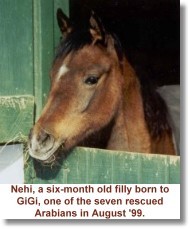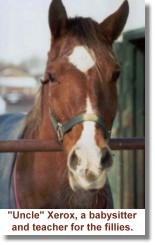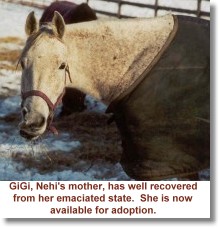
You Can Train Your Horse to do Anything! - Video
$39.95
| |
|
A New Beginning - The Days End Farm Horse Rescue
|
Days End Farm Horse Rescue (DEFHR) offers “a new beginning” to horses who have been neglected, abused, abandoned, or relinquished. Founded in 1989 by Kathleen and Allan Schwartz, this facility has grown from the rescue of one horse to approximately 700 horses over ten years later. Having received its non-profit status by the end of 1991 and become the first all-breed horse rescue in the State of Maryland, DEFHR has been treating neglected and abused horses ever since with the help of volunteers and donations.
Two of the horses currently at DEFHR may never have had that chance for a new beginning – two fillies, born in June of 2000, are thriving, healthy young horses.  Their mothers, Alkamsa Blue List Morific Line Arabians, are two of seven horses that had been impounded in August of 1999, severely emaciated as a result of owner cruelty and neglect. The mothers have also recovered, with one of them currently up for adoption and the other within months of being available. Since being weaned, the fillies have been under the tutelage of “Uncle” Xerox, an over-thirty Thoroughbred, who baby-sits and instructs them on proper ground manners and behavior. This is an excellent example of how DEFHR not only cares for those which have been neglected or relinquished because of old age, but finds “new work” for them and makes their last years useful and fun. Their mothers, Alkamsa Blue List Morific Line Arabians, are two of seven horses that had been impounded in August of 1999, severely emaciated as a result of owner cruelty and neglect. The mothers have also recovered, with one of them currently up for adoption and the other within months of being available. Since being weaned, the fillies have been under the tutelage of “Uncle” Xerox, an over-thirty Thoroughbred, who baby-sits and instructs them on proper ground manners and behavior. This is an excellent example of how DEFHR not only cares for those which have been neglected or relinquished because of old age, but finds “new work” for them and makes their last years useful and fun.
As with these mares, some of the horses that arrive at the DEFHR have been seized by Animal Control from their owners due to the horrible conditions under which they were living. These horses experience innumerable sufferings, including starvation, emaciation, dehydration, untreated injuries, untended hooves, sores, parasites, skin diseases, and a variety of other illnesses that often result in permanent damage. A few are in such advanced stages of deterioration that they are unable to overcome these challenges. Despite DEFHR’s best efforts, these horses either die on their own or are humanely euthanized. Fortunately, many do survive and, depending on the nature of their case, either find new homes or stay at DEFHR for the rest of their lives.
Rescue Procedures
In those instances where the horses are impounded by Animal Control, certain procedures are in place to ensure the utmost safety and protection for the horse. Individuals from DEFHR go to the site to assist in picking up the horses, which most often involves Kathleen and Allan Schwartz, who are certified Animal Cruelty Investigator Instructors through the University of Missouri Law Enforcement Institute, the American Humane Association, and the University of Maryland. Though DEFHR assists in the pick-up, Animal Control is actually responsible for the impoundment itself. Otherwise, the owners could sue DEFHR for custody of the horses – costly litigation in which the farm can not afford to involve itself.
The horses are then placed in a quarantine facility until it is determined that they have no communicable diseases and they have received their Coggins. It also serves as a place for the horses to “quiet down” after the removal. Once they “pass,” they are brought to DEFHR, where they are started on light hay and forage to reduce the chance of shocking their system. Shortly thereafter, they are introduced to a mash – a mixture of feed and water – as well as a daily wormer (DEFHR currently uses a product to be administered daily because that is what has been donated). A veterinarian assesses the horses’ condition to determine what other medical problems there may be and what course of rehabilitation will be necessary, including the proper treatment for injuries or illnesses. These efforts continue until the horses reach a healthy weight and condition, which, on average, takes about six to nine months. When the seizures involve court cases, DEFHR painstakingly documents the care of these horses and the steps taken to rehabilitate them. They record the time of every feeding, any medicines given and the times, as well as any visits and treatment provided by veterinarians or farriers.
DEFHR usually waits for any dental work to be performed on the horses until they are healthy. This is important in case the horses have to be sedated for any procedure. The farrier, however, is usually called in shortly after the rescue, especially with those suffering from hoof deformities or other problems as a result of the neglect. In some instances, though, the call to the farrier may have to wait until the horse is able to handle the visit. One relinquished horse, a Mustang mare named Antsie, had to wait eight months before a farrier could properly attend to her because she was so feral.
When the owner relinquishes custody or the courts rule against the owners, DEFHR takes full ownership of the horses. Once they are rehabilitated to a healthy condition, DEFHR evaluates the horses and their level of training. A trainer, Jake Nodar, who is certified in the John Lyons method of training and operates pro bono, works with the horses on any problems, such as rearing or bucking. He, along with some of the other volunteers, also trains and works with the horses under saddle. DEFHR’s effort is to make the horses “lovable” and adoptable. Once DEFHR has assessed the demeanor, capabilities, level of training, and soundness, the horses are put up for adoption.
DEFHR has developed several programs to either assist in caring for the horses or educate the public about animal cruelty and the very important role of the horse rescue organization. These programs include, but are not limited to:
- Adoption Program – a program whereby rehabilitated horses that have been fully evaluated by DEFHR trained personnel are made available for the public to adopt under very stringent requirements.
- Foster Program – a program whereby the public can assist in caring for a horse, learn about horse care and ownership through a one-on-one relationship with one of the residents, and help defray medical, feed, and other care-related costs of a specific horse.
- Save Our Seniors (S.O.S.) Campaign – a program whereby the public can assist in caring for a horse that is of too advanced an age or suffering from too much “damage” as a result of abuse or neglect to be adopted. The public can help to care for the horse directly or help defray the medical, feed, and other care-related costs of the horse.
- “Hands On” Training for Equine Cruelty Investigators – an on-site educational program to assist animal cruelty investigators in learning how to handle horses, identify horses by distinguishing characteristics, and assess the horses' condition
- If Only Love Was Enough – an on-site educational program designed to help first-time horse owners understand the fundamentals in horse care, including handling, feeding, and grooming.
- Share A Heart – an outreach educational program to help the public better understand animal abuse and neglect, and the role of DEFHR in helping the horses. Part of the program is designed specifically for schools, while the other is comprised of a lecture series that also includes other topics, such as starting a horse rescue, equine cruelty investigation, and basics in horse care for first-time horse owners.

In another effort to educate the public, Kathleen and Allan Schwartz have published a manual entitled Guidelines for Establishing a Horse Rescue, which details DEFHR’s own beginnings, as well as the steps necessary to becoming a non-profit horse rescue operation. For a $100.00 donation, an individual interested in establishing his or her own facility can receive this book and learn from their personal experience and expertise. They also have a toll-free number via which you may ask questions on horse rescue, seek assistance on starting your own facility, and report any incidents of horse abuse, cruelty, or neglect.
One of the key factors in keeping DEFHR running, besides the six to seven staff members, is the volunteers – up to 400 over a year and 150 active on a weekly basis – who offer their time and assistance in a wide range of areas:
- Feeding the horses, making sure they have plenty of water, and keeping the stalls clean
- Maintaining the farm’s grounds (e.g., fencing, structures, repairs, etc.)
- Office assistance, including filing, data entry, and miscellaneous office duties
- Assistance with educational programs, including holding the horse and watching for the safety of the participants
- Help with marketing and public relations, including manning booths, distributing flyers, assisting with yearly fundraisers, working on the web site, or writing for the newsletter
- Follow-up visits of horses adopted out
- Assistance with training or retraining of new arrivals to make sure adoptable
- Photograph newly arrived horses to document condition of the horse before, during, and after rehabilitation
DEFHR values all forms of donations, whether it is an individual’s time, money, tack, or supplies. They have developed a Wish List of items that are necessary in the day-to-day care of the horses and the operations of the farm. They also have donated items for sale, from which the proceeds will go to the funding for the horse rescue.
In the past ten years, Days End Farm Horse Rescue has brought awareness to the cruelty inflicted upon horses; provided a home for several hundred equine friends; ensured a safe and happy environment for those horses adopted out, instructed others on ways to identify mistreatment, neglect, and unhealthy conditions in horses; educated hundreds of people about proper horse care, management, and ownership skills; and paved the way to encourage other people to start their own horse rescue. In an ideal world, their services would not be needed. Unfortunately, this is not an ideal world and horses suffer cruel fates meted out by human hands. Thankfully, though, DEFHR does exist to provide those horses with a safe haven and “a new beginning.”
For more information on the Days End Farm Horse Rescue, please go to their web site at www.defhr.org.
|
|
|
|
|
|
|



